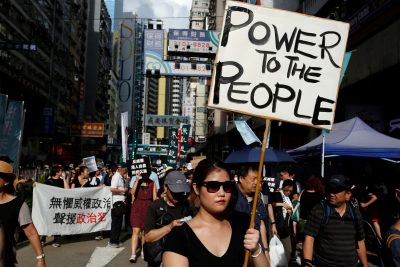Author: Ray Yep, City University of Hong Kong
2017 was a year of disillusion and anxiety for Hong Kong’s people.
It started with a false dawn. The unexpected decision of the hugely unpopular Leung Chun-ying not to seek a second term as chief executive of the Hong Kong Special Administrative Region offered a glimpse of hope for the local community. Many see Leung as a divisive and manipulative visionary; by contrast, his successor Carrie Lam is a civil servant-turned-politician and has a reputation as a competent and fair-minded administrator. She has also filled her cabinet with people of similar career trajectories: the majority of the ministers have served in the civil service before.

Lam’s strategy of governing is simple: stay away from political controversies and focus on policy matters. She was unequivocal in her first policy address: the new administration has no specific timetable for rekindling the debate on universal suffrage. At the same time, she remained evasive on the issue of Article 23 legislation — a law proposed in 2002 that would suppress seditious activities against China in Hong Kong. She instead reiterated that her priorities included matters like housing supply, welfare reform and economic development. Lam’s strong hint that her administration would increase public spending also helped her score a few points in opinion polls.
A considerable segment of the local population is frustrated with the relentless political dramas of the Legislative Council as well as with the general stasis in policy processes over the five years of the Leung administration. Lam’s strategy has consequently made progress in winning public support.
The Chief Executive has an unfortunately peripheral role in dictating the rhythm of Hong Kong politics — Beijing’s position matters most. The Chinese Communist Party (CCP) made the most authoritative articulation yet of its Hong Kong policy at the 19th Party Congress held in late 2017. Two clear messages were crystallised in the Congress pronouncement: Beijing enjoys ‘comprehensive jurisdiction’ over Hong Kong and has zero tolerance for any form of separatism. The former confirms Beijing’s full authority over Hong Kong despite the promise of a high degree of autonomy under the framework of ‘one country, two systems’.
The CCP believes that it is perfectly entitled to get involved in the domestic affairs of Hong Kong if circumstances permit. One of these possible ‘circumstances’ is when the CCP perceives its imperatives of national dignity and territorial integrity to be under threat. Beijing will not hesitate to respond and will take whatever measures the situation warrants when this occurs. A more proactive approach in handling Hong Kong is thus on the horizon.
These affirmations are nothing new — Beijing did not shy from taking provocative measures to reverse ‘undesirable’ trends in Hong Kong in 2017. Upon the ‘request’ of the Hong Kong government in late 2016, the Standing Committee of the National People’s Congress interpreted a clause of the Basic Law (Hong Kong’s mini-constitution) on the oath-taking procedure in the Legislative Council. The move effectively removed two popularly elected legislators (Yau Wai-ching and Sixtus ‘Baggio’ Leung) who showed great disdain for the People’s Republic of China. Both individuals displayed flags printed with the slogan ‘Hong Kong is not China’ during the swearing-in ceremony of the Legislative Council.
The saga continued in 2017 as another batch of four legislators, including ‘Long Hair’ Leung Kwok-hung, were disqualified on the same grounds in July. Yau Wai-ching, Sixtus Leung and these four legislators cumulatively commanded about 200,000 popular votes in the 2016 election. They are all seen by Beijing as separatists and are thus a threat to national sovereignty. Beijing’s inclusion of the newly passed National Anthem Law into the Annex of the Basic Law in November further attests to the CCP’s irritation with Hong Kong’s trend towards sedition and ‘unhealthy development’. This irritation is a reaction to the numerous cases of booing and insults towards China’s national symbol during international football games played in Hong Kong. The new law could make any disrespectful behaviour towards the national anthem punishable in local jurisdictions.
Beijing does not necessarily see its intrusion as a matter of dignity and political concern. It could also be a gesture of care and support for its compatriots in Hong Kong. In late December, the Standing Committee of the National People’s Congress approved the Hong Kong government’s proposal of a joint check-point for a cross-border high-speed rail in Hong Kong. One of the reasons behind this approval was that Beijing sees further integration between Hong Kong and the mainland as imperative to the economic future of Hong Kong. Nevertheless, the arrangement does imply mainland officials can enforce national laws in part of the West Kowloon Terminus in Hong Kong. All of these developments exacerbate trepidation towards the incessant erosion of Hong Kong’s autonomy and further undermine local confidence in the future of one country, two systems.
Ray Yep is Professor of Politics and Associate Head of Department of Public Policy, City University of Hong Kong.
This article is part of an EAF special feature series on 2017 in review and the year ahead.
http://www.eastasiaforum.org/2018/01/26/the-empire-strikes-back-hong-kong-edition/